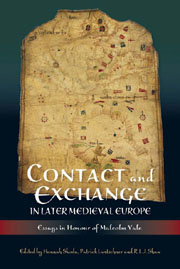Book contents
- Frontmatter
- Contents
- List of Illustrations
- List of Contributors
- Acknowledgements
- The Work of Malcolm Vale
- Principal Bibliography of Malcolm Vale
- Introduction
- Part I Boundaries and Units
- Introduction
- Economic Development, Social Space and Political Power in Bruges, c. 1127–1302
- Flemings in the Peasants' Revolt, 1381
- Does a Common Language Mean a Shared Allegiance? Language, Identity, Geography and their Links with Polities: The Cases of Gascony and Brittany
- Revisiting the Political Uses of Vernacular Language in Portugal during the Thirteenth Century: On Models, Motives and Modes
- Scotland in the Later Middle Ages: A Province or a Foreign Kingdom for the English?
- The Angevin Legacy, Dynastic Rivalry and the Aftermath of the Hundred Years War, 1453–1491
- Part II Practices of Exchange
- Conclusions
- Index
- Tabula Gratulatoria
Flemings in the Peasants' Revolt, 1381
from Part I - Boundaries and Units
Published online by Cambridge University Press: 05 February 2013
- Frontmatter
- Contents
- List of Illustrations
- List of Contributors
- Acknowledgements
- The Work of Malcolm Vale
- Principal Bibliography of Malcolm Vale
- Introduction
- Part I Boundaries and Units
- Introduction
- Economic Development, Social Space and Political Power in Bruges, c. 1127–1302
- Flemings in the Peasants' Revolt, 1381
- Does a Common Language Mean a Shared Allegiance? Language, Identity, Geography and their Links with Polities: The Cases of Gascony and Brittany
- Revisiting the Political Uses of Vernacular Language in Portugal during the Thirteenth Century: On Models, Motives and Modes
- Scotland in the Later Middle Ages: A Province or a Foreign Kingdom for the English?
- The Angevin Legacy, Dynastic Rivalry and the Aftermath of the Hundred Years War, 1453–1491
- Part II Practices of Exchange
- Conclusions
- Index
- Tabula Gratulatoria
Summary
[…] and many fflemynges loste here heedes at that tyme, and namely they that koude nat say ‘breede and chese’, but ‘case en brode’
Thus ends the account of the Peasants' Revolt in a London chronicle, the British Library's Cotton MS Julius B. II. The statement is striking: why would Flemings have ‘lost their heads’ in the Peasants' Revolt at all, given that Flemings took no active part in the rebellion and had no obvious connection with the poll tax (which sparked the revolt) or with the issue of villeinage which so pre-occupied the rebels? The content of the statement is puzzling, and so is its form: records of direct speech from the fourteenth century are rare, and few individuals would have been less likely to have their words recorded than the alien victims of a riotous mob. Nonetheless, this chronicle tells us both what the victims said (or how they pronounced what they said) and what they should have said but failed to say. Why did a rebel mob rampaging through London, beheading the archbishop and ransacking the Savoy, concern itself with Flemings talking about food? Why did a chronicler choose to record these details in his short narrative of the rebellion? How does this bloody conflict relate to peaceful commercial exchange between Flanders and England at other times in the later Middle Ages?
While the Peasants' Revolt has been studied in depth by generations of medieval historians, the same cannot be said of England's foreign-born inhabitants, and the largest group among these, the so-called Flemings (a term which was also applied to those from other principalities in the Low Countries besides Flanders).
- Type
- Chapter
- Information
- Contact and Exchange in Later Medieval EuropeEssays in Honour of Malcolm Vale, pp. 59 - 78Publisher: Boydell & BrewerPrint publication year: 2012



